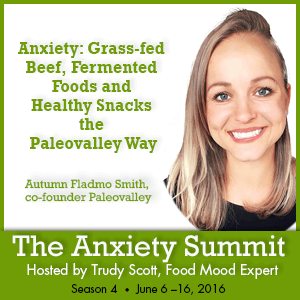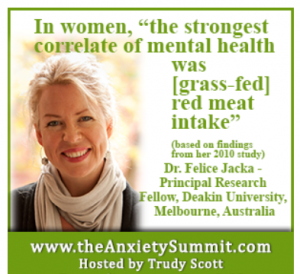
Autumn Fladmo Smith, co-founder Paleovalley, is interviewed on the Anxiety Summit by host of the Anxiety Summit, Trudy Scott, Food Mood Expert and Nutritionist, author of The Antianxiety Food Solution.
Anxiety: Grass-fed beef, fermented foods and healthy snacks the Paleovalley way
- can dietary intervention reduce anxiety?
- how the health of the mother affects the child’s mental health
- nutritional and mental health benefits of grass-fed beef vs. conventionally raised beef
- benefits of fermented foods for mental wellbeing
- healthy snacks for blood sugar control and anxiety
- GMOs, the shikimate pathway and serotonin
- Paleovalley’s mission, 100% grass-fed beef sticks, why they are fermented, and how/why GMOs and hydrogenated oils were avoided
Here are some gems from our interview:
What happened in around 2009, although the link between diet and mental health was rarely investigated prior to that time, a researcher from Deacon University named Dr. Felice Jacka came on the scene and she did her dissertation exploring dietary patterns. So not only taking those dietary triggers, which were just really specific foods, but also seeing what were people eating as overall dietary patterns that was making a difference? And when she did that research she kind of noted two different diets emerging. And that’s the traditional diet with high intakes of grass fed meats, fish, vegetables and fruit and then our all too familiar SAD diet, the American standard diet. And what she found was that there were very, very different outcomes, mental health wise, for people who were eating the traditional versus the processed diet. And in fact her dissertation elucidated that if you were eating higher amounts of processed food or a standard American diet you had a 50 percent greater incidence of depression and anxiety. So that was really an important finding for my thesis.
Here is a link to Dr. Felice Jacka’s interview on season 1 of the Anxiety Summit: The Research – Food to prevent and treat anxiety and depression?
It was in this interview that Dr. Jacka said this:
“In our study, out of every single dietary food grouping that I looked at including vegetables, fruits, salads, beans, etc the strongest correlate of mental health was red meat intake,” grass-fed red meat of course.

This blog discusses Dr. Jacka’s current SMILES study on diet in anxiety and depression – A RCT of a dietary intervention for adults with major depression (the “SMILES” trial): study protocol. We should see published results shortly.
Autumn shares these benefits of grass-fed red meat:
Grass fed red meat is different in two main ways. And that’s because it has higher and a different fatty acid profile, especially omega-3 fatty acid. There seems to be more, I think three to five times more than conventional raised beef. And that’s important because omega-3 are known to be very therapeutic for mental health and a number of other health issues. So as many of those omega-3’s as we can get is a good thing. But what it also does is there’s omega-3 fatty acid and there’s omega-6 fatty acid and it improves the ratio. It has kind of a perfect ratio. Our ancestors had a ratio between these two fatty acid’s of about one to one and the common American today has a ratio of about 20 to one, which they hypothesize, and a lot of research suggest, leads to inflammation in the body, which is the root of basically all degenerative diseases. So grass fed beef has a ratio of about 1.5 to one, which is almost perfect compared to one to 7.5 in conventionally raised beef. So that’s just a huge difference.
And then there’s also something called CLA, which is another fatty acid known to have cancer fighting properties. One study showed that the women who ate the most CLA had a lower risk of breast cancer. And it’s also known to optimize the deposition of fat in the body so that’s really important. But the other major benefit of grass fed beef is its antioxidant profile. There’s higher levels of glutathione, which is our bodies master antioxidant. There’s I think seven times more vitamin A or beta-carotene, the precursors to vitamin A. And I think three times more vitamin E. There’s also higher levels of B vitamins, which are so critical for mental health, and minerals, especially zinc and iron and magnesium, which are also really, really important for mental health. But the other side of the coin is, like Trudy said, what we’re not getting that conventionally raised beef has to offer and that is the hormones, the antibiotics and the pesticides, which just wreak havoc on our health. And toxins are stored in fat as well, which is a really, really important thing to remember. So when you’re eating the fat of a conventionally raised animal that fat is actually storing up all of those toxins and then you’re getting a healthy dose in every bite. So basically grass fed beef is allowing us to only put into our body what’s going to allow us to thrive and none of what won’t, which is why I’m so passionate about it.
Here is Autumn’s digital gift: her antianxiety protocol based on her thesis
You can use this link to get 30% off Paleovalley’s 100% grass-fed beefsticks
If you are not already registered for the Anxiety Summit you can get live access to the speakers of the day here: www.theAnxietySummit.com
Missed this interview or can’t listen live? Or want this and the other great interviews for your learning library? Purchase the MP3s or MP3s + transcripts and listen when it suits you.
You can find your purchasing options here.: Anxiety Summit Season 1, Anxiety Summit Season 2, Anxiety Summit Season 3, and Anxiety Summit Season 4.